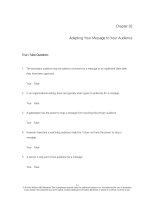Business communication building critical skill 6th module020
Bạn đang xem bản rút gọn của tài liệu. Xem và tải ngay bản đầy đủ của tài liệu tại đây (688.59 KB, 20 trang )
Making Oral
Presentations
Module Twenty
McGraw-Hill/Irwin
Copyright © 2014 by The McGraw-Hill Companies, Inc. All rights reserved.
Learning Objectives
LO 20-1 Apply strategies for good presentation
plans.
LO 20-2 Apply strategies for strong openers and
closes.
LO 20-3 Apply strategies for best vocal delivery.
LO 20-4 Apply strategies for good presentation
organization.
20-2
Learning Objectives
LO 20-5 Apply strategies for effective
presentation delivery.
LO 20-6 Explain techniques for audience
question responses.
LO 20-7 List guidelines for group
presentations.
20-3
Purposes of Oral Presentations
Informative Presentations
Inform or teach the audience.
Persuasive Presentations
Motivate the audience to act.
Goodwill Presentations
Entertain and validate the audience.
20-4
Avoiding Mistakes
1.
2.
3.
4.
5.
Meet the audience where they are.
Make a heartfelt human connection.
Show respect for the listener.
Inspire follow-up thinking/action.
Leave a lasting message of significance.
20-5
What decisions do I need to make as I
plan a presentation?
Your main point
The kind of presentation
Ways to involve the audience
20-6
Choosing the Kind of Presentation
Monologue presentation
the speaker speaks without interruption
Questions are held until the end of the
presentation
Guided discussion
the speaker presents the questions or issues
that both speaker and audience have agreed on
in advance
20-7
Choosing the Kind of Presentation
Sales presentation
a conversation, even if
the salesperson stands
up in front of a group
and uses charts and
overheads
20-8
Planning Visuals and Other Devices to
Involve the Audience
Make one main point per visual.
Give each visual a title.
Try to limit information to 35 words.
Don’t put your visual up until you’re ready to
talk about it.
Use animation schemes to control the
information displayed in a way that supports
the main points
20-9
PowerPoint Slides for an
Informative Presentation
20-10
How can I create a strong opener
and close?
20-11
How can I create a strong
opener and close?
For a close, you can:
Restate your main point.
Refer to your opener.
End with a vivid, positive picture.
Tell the audience exactly what to do to solve
the problem you’ve discussed.
20-12
Finding Your Best Voice
Pitch
whether a voice
sounds high or low.
Intonation
variation in pitch,
stress, or tone.
Tempo
speed.
Volume
loudness or softness.
20-13
How should I organize a presentation?
Chronological
Start with the past, move to the present, and
end by looking ahead.
Problem-Causes-Solution
Explain the symptoms of the problem, identify
its causes, and suggest a solution.
20-14
How should I organize a presentation?
Excluding Alternatives
Explain the symptoms of the problem.
Explain the obvious solutions first and show
why they won’t solve the problem.
End by discussing a solution that will work.
20-15
How should I organize a presentation?
Pro-Con
Give all the reasons in favor of something, then
those against it.
1-2-3
Discuss three aspects of a topic.
20-16
What are the keys to delivering an
effective presentation?
20-17
How should I handle questions
from the audience?
Anticipate questions that might be asked.
Be honest.
Rephrase biased or
hostile questions.
20-18
Group Presentation Tips
For divided presentations
Plan transitions.
Enforce time limits strictly.
Coordinate your visuals so that the presentation
seems a coherent whole.
Practice the presentation as a group at least
once; more is better.
20-19
What are the guidelines for
group presentations?
For integrated presentations
Write a very detailed outline.
Choose points and examples.
Create visuals.
20-20









